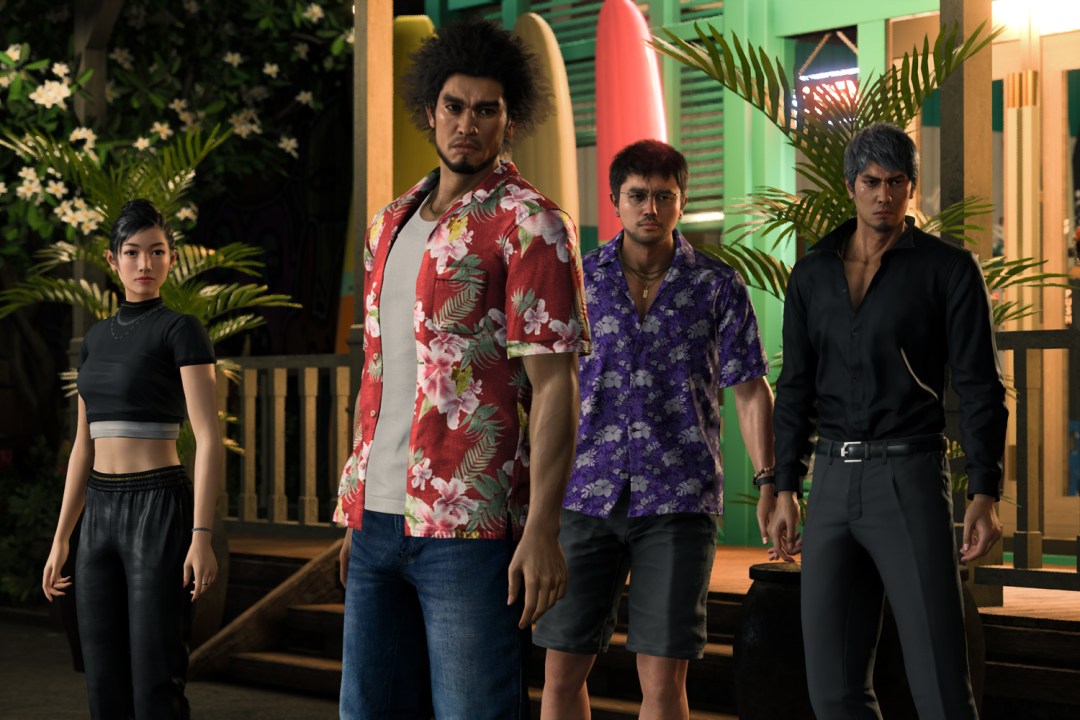Like a Dragon: Infinite Wealth review – embarrassment of riches
Role-playing, relaxing and reminiscing in the Sega series’ biggest game to date

Stuff Verdict
Big in content and heart, Like A Dragon: Infinite Wealth brings the series’ past and present together with maximum charm.
Pros
- Great heartfelt character writing with lots of laughs
- Tons of fun activities and side quests
- Improved and more ‘actiony’ turn-based battle system
- Big emotional payoffs for longtime fans
Cons
- Money and XP can be a grind
- Battles still have some annoying quirks
- Locking post-game features behind pricier editions feels miserly
Introduction
Like wondering if you can watch a new Marvel film without having done homework beforehand, series newcomers might be nervous about jumping into Like a Dragon: Infinite Wealth. This is a series that’s been around long enough to completely re-brand itself, after all. There’s certainly a lot here to reward longtime fans like myself. But all you really need to know is that you’ll be spending an epic Hawaiian holiday with some of the most charismatic characters in gaming.
This was already a series that tonally whiplashed between laugh-out-loud comedy and gut-punching drama. Infinite Wealth takes this to the extreme with two leading men that draw a line between the former Yakuza games’ past and future. So put on your loudest shirt, grab a Mai Tai, and let’s dig into some of the riches you can indulge in.
Cultural exchange


Infinite Wealth marks the first time Like A Dragon (a series made primarily for Japanese players, set in Japan, and focused entirely on its culture and politics) has moved the story abroad. As well as demonstrating how much more international the series has gotten, Hawaii also feels like a natural extension, given Japan’s long-standing tourist ties with the US state.
There may now be English voices mixed in with the original Japanese audio (there’s also an excellent English dub, as well as another in Chinese) but much of what makes the series so special is still here. Only now there’s more of it.
Honolulu is a huge map that recreates fictionalised versions of the city’s well-known spots including Waikiki Beach, its large shopping mall, as well as its trendy arts district. You can also visit past locations in Japan, making it easily the series’ largest game in terms of square feet. That’s still small fry compared to say GTA V, but it’s made up for by density.
Options to get around faster include calling a taxi for fast travel, taking in the sights via tram (which also has its own bizarre mini-game), or even hopping on a Segway-type scooter. You’re really encouraged to take your time and explore on foot, though. There’s always a collectible item twinkling in the distance, palm trees to charge into and reap fallen surprises from, and locals to instantly befriend. Pressing a button to say ‘Aloha’ shows just how chill and friendly everyone is in Hawaii.
Well, not everyone. Because it wouldn’t be a Like A Dragon game without also regularly running into unsavoury locals who just want to pick a fight. It’s one way that Infinite Wealth’s story sheds a light on the darker side of the island state, from tourist scams to a homelessness crisis. Even when on holiday Infinite Wealth keeps to the series’ themes, which are less about life in the criminal underworld and more about finding redemption even when you’re in the gutter.
Double dragons


There’s no better company for Infinite Wealth’s sprawling campaign than Ichiban Kasuga, a former yakuza with a heart as big as his wild hair. He may be a dumb goofball at the best of times, but he’s so earnest and trusting to a fault that he’s impossible to hate. This despite having his previous heroics undone after being exposed by a whistleblowing VTuber – an intriguing commentary on online cancel culture.
He also shares the top billing with the series’ original protagonist, legendary yakuza Kazuma Kiryu. While he initially appears as one of Kasuga’s allies, the plot eventually splits the party in two. Despite having supposedly retired two games earlier, developer RGG Studio clearly felt Kiryu deserved one last hurrah, even though it’s through (spoilers ahead) the most grave of situations.
Kiryu has cancer and apparently only months to live, though it’s not stopping him from throwing down. It may seem counterintuitive to play as a dying man in an RPG where you’re constantly levelling up and getting stronger, but his arc is cleverly framed through the Bucket List. This gives opportunities to reminisce about the past and tie up loose ends, in turn awakening his strength to fight, come what may.
The overall plot is as convoluted as always. Its double/triple-crosses and conspiracies go all the way up to the top, and are told through lengthy expositional cutscenes. Yet the script’s compassion for these flawed characters, many who have faced adversity only for powers beyond their control to knock them down again, means it’s quite easy to forgive any contrivances. You’re completely rooting for these oddballs and outcasts to get a second chance at life, and give the real scumbags a well-deserved beatdown.
Hawaii shakedown


Much like previous title Yakuza: Like A Dragon, Infinite Wealth uses a party-based turn-based battle system. It’s a weird adjustment for Kiryu, who’s traditionally been a one-man army, but it also helps that the mechanics feel more action-packed than its predecessor. For example, during your character’s turn you can move them around in a small circle, which adds a layer of tactics. Positioning them closer to an enemy grants bonus damage, or next to objects that can be picked up as weapons. Your position is key for special attacks that target multiple enemies, whether through damage in an arc in front of you, or healing allies within a circle area of effect.
There’s also action in the moment-to-moment. Perfectly-timed button presses help reduce damage against enemy attacks, while building up bonds with allies might lead to them following up with special tag-team attacks. You can also knock back enemies into one of their goons, or into an ally for an extra smackdown.
While these improvements are welcome, it still has some quirks – notably how enemies can also move around during your turn to scupper your plans. There are also moments when characters get stuck in the scenery while you’re trying to attack someone. Like any RPG it’s not immune to grind, although at least story-critical missions recommend a minimum level before attempting.
You won’t want to rush anyway, because the best part about this series has always been its ridiculous side content, but XP is only ever earned through fights. This instalment makes it easier to avoid confrontation, but you’ll have to charge into most encounters regardless. And that’s just one element of the grind, since job classes also have their own levels. Buying and upgrading gear is also costly. But hey, having a great holiday often does require having a good budget, doesn’t it?
Infinite jest


Whatever that sub-title refers to, it’s no exaggeration that there’s a near-infinite amount of things to do in this game. It doesn’t skip an opportunity to come up with silly but charming ways to gamify every little interaction, and almost every new feature is introduced by a ridiculous side quest.
There’s naturally the chance to visit classic Sega arcade games, such as Virtua Fighter 3TB and 3D brawler SpikeOut. Sadly these cabinets are no longer found in Sega-branded arcade centres, just like in real life. More ludicrous activities include a Crazy Taxi-like food delivery game and another that pokes fun at dating apps.
Much more substantial distractions include one that parodies Pokémon, letting you recruit, train and battle the surreal real-life enemies you encounter using a totally different turn-based system. The biggest sees Kasuga whisked off to another island in a hilarious parody of Animal Crossing: New Horizons. With its own mechanics, day-night cycle and currency, it’s easy to lose many hours as you transform a landfill into a dream resort. That includes cleaning up garbage, farming for resources, building and furnishing the island, then inviting guests to have their dream holiday. This in turn makes money you can spend back in the main game.
The other activities and side quests, no matter how trivial or throwaway, still ultimately feeds back into the game’s core. They either provide useful new abilities or equipment, improve your bonds with other characters, or raise stats that unlock other features.
I only stop short of calling Infinite Wealth a very generous game owing to certain post-game features being limited to the more expensive deluxe editions of the game. A single playthrough still takes about 70 hours without completing all the side activities, but it’s a poor decision nonetheless. At least it’s not charging extra for early access, I suppose.
Like A Dragon: Infinite Wealth verdict


With so much to do Like A Dragon: Infinite Wealth feels like a daunting prospect, and even more so if you’re completely new to the series. But any qualms you might have fall to the wayside when you’re spending it with the lovable idiot Kasuga (who wants to be mates with everyone, even if they trick or try to kill him), and the stoic legend Kiryu as he faces up to his legacy.
Yes, this game can be messy, convoluted, and takes a lot of liberties, despite being very self-aware as a capital V video game. But whether through its story and characters who will make you laugh as well as cry, or the abundance of activities and features it keeps introducing just when you thought you’ve seen all there is to see, it just has so much to give. All you need is to give it time.
Stuff Says…
Big in content and heart, Like A Dragon: Infinite Wealth brings the series’ past and present together with maximum charm.
Pros
Great heartfelt character writing with lots of laughs
Tons of fun activities and side quests
Improved and more ‘actiony’ turn-based battle system
Big emotional payoffs for longtime fans
Cons
Money and XP can be a grind
Battles still have some annoying quirks
Locking post-game features behind pricier editions feels miserly



